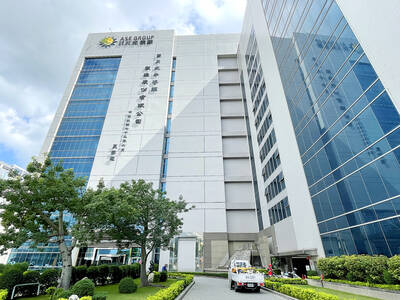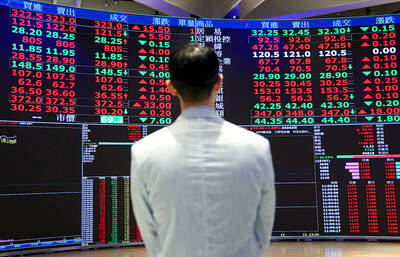Consumers who have purchased MOTIF cosmetics products, which were found to contain banned ingredients, should receive full refunds with or without receipts, the Consumers' Foundation (
Refunds should be given even if customers only can show empty bottles or small boxes as proof of purchase, said Terry Huang (黃怡騰), publisher of the nonprofit organization's magazine Consumer Reports of Taiwan, claiming it was required by the Consumer Protection Law (消費者保護法).
"When products have been proved to be harmful to people, manufacturers should shoulder responsibility by reimbursing customers without conditions," he said by telephone.
The Taichung branch of the Ministry of Justice found on Friday that MOTIF, a brand of expensive cosmetics available at department stores and through online shopping Web sites, had banned substances in its products, including the antibiotic Lincomycin and Dexamethasone, a steroid.
MOTIF had claimed to be an Australian firm but the products were in reality being produced at an underground Taichung County factory.
One of the company's products, which it claimed could cure acne, was sold at department stores for NT$1,800, although it cost less than NT$33 to produce.
Investigators estimated that the company had made more than NT$100 million (US$3 million) in profits.
MOTIF's employees will be charged with violation of the Pharmaceutical Affairs Law (藥事法) and fraud, investigators said.
MOTIF's counters at Shin Kong Mitsukoshi Department Store (
"We are surprised that MOTIF has sold illegal products. The brand is quite popular with our shoppers and many of them have come to ask for refunds over the weekend," a public relations official with Pacific Sogo Department Store said.
But these major retailers demand that consumers seeking refunds provide receipts as proof of purchase, which Huang said was unreasonable.
Consumers are advised to contact their local governments if they are denied refunds.
In the wake of the cosmetics scam, the Department of Health announced that it would team up with the Consumers' Foundation and introduce a new monitoring mechanism, as well as conducting random inspections of cosmetics available via Internet, TV and radio ads.
The first wave of checks will be conducted in Taipei, Taichung Kaohsiung, Pingtung, Hualien and Taitung, as well as in Taipei and Taichung counties.
The department said on its Web site that it would investigate brands with ads that exaggerate the qualities of their products.
The investigation will focus on whether the samples contain Western medicine, such as antibiotics or steroids, or heavy metals, including lead, cadmium and mercury.

EXPANSION: The investment came as ASE in July told investors it would accelerate capacity growth to mitigate supply issues, and would boost spending by 16 percent ASE Technology Holding Co (ASE, 日月光投控), the world’s biggest chip assembly and testing service provider, yesterday said it is investing NT$17.6 billion (US$578.6 million) to build a new advanced chip packaging facility in Kaohsiung to cope with fast-growing demand from artificial intelligence (AI), high-performance-computing (HPC) and automotive applications. The new fab, called K18B, is to commence operation in the first quarter of 2028, offering chip-on-wafer-on-substrate (CoWoS) chip packaging and final testing services, ASE said in a statement. The fab is to create 2,000 new jobs upon its completion, ASE said. A wide spectrum of system-level chip packaging technologies would be available at

Taiwan’s foreign exchange reserves hit a record high at the end of last month, surpassing the US$600 billion mark for the first time, the central bank said yesterday. Last month, the country’s foreign exchange reserves rose US$5.51 billion from a month earlier to reach US$602.94 billion due to an increase in returns from the central bank’s portfolio management, the movement of other foreign currencies in the portfolio against the US dollar and the bank’s efforts to smooth the volatility of the New Taiwan dollar. Department of Foreign Exchange Director-General Eugene Tsai (蔡炯民)said a rate cut cycle launched by the US Federal Reserve

HEAVYWEIGHT: The TAIEX ended up 382.67 points, with about 280 of those points contributed by TSMC shares alone, which rose 2.56 percent to close at NT$1,400 Shares in Taiwan broke records at the end of yesterday’s session after contract chipmaker Taiwan Semiconductor Manufacturing Co (TSMC, 台積電) hit a fresh closing-high amid enthusiasm toward artificial intelligence (AI) development, dealers said. The TAIEX ended up 382.67 points, or 1.45 percent, at the day’s high of 26,761.06. Turnover totaled NT$463.09 billion (US$15.22 billion). “The local main board has repeatedly hit new closing highs in the past few sessions as investors continued to embrace high hopes about AI applications, taking cues from a strong showing in shares of US-based AI chip designer Nvidia Corp,” Hua Nan Securities Co (華南永昌證券) analyst Kevin Su

Nvidia Corp’s major server production partner Hon Hai Precision Industry Co (鴻海精密) reported 10.99 percent year-on-year growth in quarterly sales, signaling healthy demand for artificial intelligence (AI) infrastructure. Revenue totaled NT$2.06 trillion (US$67.72 billion) in the last quarter, in line with analysts’ projections, a company statement said. On a quarterly basis, revenue was up 14.47 percent. Hon Hai’s businesses cover four primary product segments: cloud and networking, smart consumer electronics, computing, and components and other products. Last quarter, “cloud and networking products delivered strong growth, components and other products demonstrated significant growth, while smart consumer electronics and computing products slightly declined,” compared with the